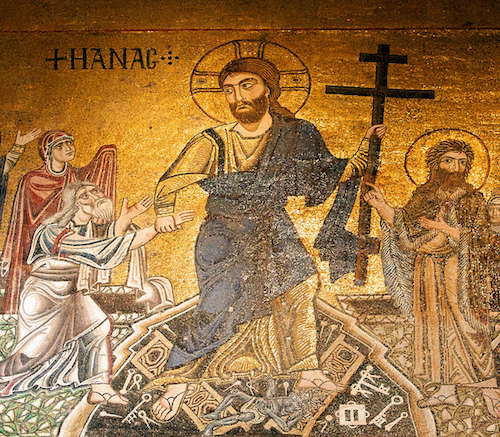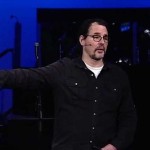We run our website the way we wished the whole internet worked: we provide high quality original content with no ads. We are funded solely by your direct support. Please consider supporting this project.

How the Anabaptists Emphasized the Cross
Because the Anabaptists have generally emphasized faith that is evidenced by works and thus on Jesus’ life as an example to be followed, it may prima facia appear that the saving work of the cross was less central to the early Anabaptists than it was to the Reformers and to Evangelicals. In reality, I would argue, this is not at all the case.
Given how persecuted the early Anabaptists were, it’s not surprising that they rarely discussed atonement theories in a formal way, let alone that they never embraced any particular theory. However, when Sattler, Hubmaier, Denck and other Anabaptist leaders did write and speak about the work of Christ on the cross, they actually reflect aspects of each of the major models of the atonement in Church history. Yet, in summing up their views, Thomas Finger observes that, “[a]mong traditional models … Christus Victor can be called historic Anabaptism’s primary expression of Jesus work.” This is true, however, only “providing we add that they experienced this as more present and participatory, and more specifically shaped by Jesus’ life than most.”[1]
In other words, the central emphasis tended to be on the manner in which Jesus’ humble, self-sacrificial life and death defeated forces of evil. Yet, this emphasis was not only regarding what Jesus did for us; it included what Jesus does in us and through us. To use Finger’s terminology, their Christus Victor model was not only “conflictive” but “transformative.”[2] Because they understood Jesus’ cruciform way of defeating the powers to be something they are called to participate in, they refused to engage in violence, even as an act of self-defense when persecuted and martyred by other Christian groups.
In this light, I would argue that, in a wholly informal way, the early Anabaptists tended to integrate Jesus’ death with every other aspect of his life, which is precisely the position I argue in Crucifixion of the Warrior God. And so, while one doesn’t typically find as strong a formal emphasis on the saving significance of the cross among them as one finds among the Reformers and Evangelicals, I would argue the cross was no less thematically central to them than it was to these others.
If anything, I would argue it is more central inasmuch as the Anabaptists understood the cross not only to be the thematic center of everything Jesus was about, but also as the thematic center of everything his followers are to be about. As is the case in the NT, the early Anabaptists generally understood that to follow the one who lived a cruciform life and died a cruciform death, one must be willing to adopt a cruciform lifestyle.
[1] T. Finger, A Contemporary Anabaptist Theology: Biblical, Historical, Constructive (Downers Grove, IL: IVP, 2006), 350.
[2] ibid., 341, 343
Photo credit: Nick in exsilio via Visual Hunt / CC BY-NC-SA
Category: General
Tags: Anabaptists, Christus Victor, Cross, Cruciform Theology, Jesus
Related Reading

Ana-What?
In this sermon clip from last weekend, Greg discusses how throughout Scripture, we see a strong emphasis on positive traditions in the Church. In both the Old and New Testament, God repeatedly calls his people to be anchored with a sense of history. In this sermon, Greg explains why the Anabaptist tradition is closest to…

The Cross as a Trinitarian Event
On Calvary, the all-holy God fully identified with sinners, suffering the consequences of our sin as though he himself were guilty. While God is never culpable for the evil he allows, he nevertheless assumes responsibility for it by fully identifying with those free agents who are in fact culpable. While the Son alone suffered as…

Podcast: Is the Cruciform Hermeneutic a Little Too New?
Greg looks at the history of the Cruciform Hermeneutic. http://traffic.libsyn.com/askgregboyd/Episode_0446.mp3

Did Yahweh Crush His Son?
Though Isaiah was probably referring to the nation of Israel as Yahweh’s “suffering servant” when these words were penned, the NT authors as well as other early church fathers interpreted this servant to be a prophetic reference to Christ. Speaking proleptically, Isaiah declares that this suffering servant was “punished” and “stricken by God” (Isa 53:4,…

The Most Beautiful Truth
Jesus was God incarnate. Yet he continually referred to, and prayed to, God the Father as someone who was distinct from himself. He also continually referred to, and claimed to be empowered by, God the Holy Spirit as someone distinct from himself. And yet Jesus, along with all Jews of his time, believed there is…

The Longing of Advent
The Advent season is a time of anticipating the coming of God, in Christ, a time of turning our imagination toward the revelation of God’s love for us. This after all is the deepest longing of our heart, and our natural longings always point us to something real. We grow hungry only because there’s such…
